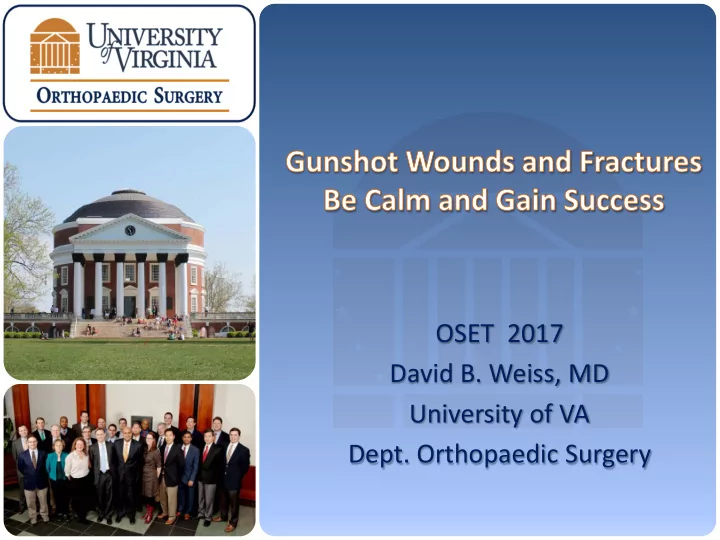

OSET 2017 David B. Weiss, MD University of VA Dept. Orthopaedic Surgery
Disclosures • OTA- Education Committee • DepuySynthes- Consulting • Globus Medical- Consulting • AO North America- Teach Courses • Elsevier- Royalties • METRC- Site PI
This Dude’s been shot!!!
61 yo M Shotgun to left thigh (close range) during home invasion FBI.gov (Mannequin)
Low vs High Velocity • Low velocity (<1000 ft/sec)- typical handgun – Damage confined to missile tract- – More deformity of bullet – Less zone of injury – Can treat like closed fracture – High Velocity (<2000 ft/sec) will be blast and increased soft tissue damage- need more extensive debridement. – Shotgun at close range considered high energy – Treat as open fracture
Deformation increases with velocity Library.med.utah.edu
Cavitation from www.Quora.com
Management of GSW • ATLS principles • Follow the bullet tracks- look for entry and exit wounds • Neuropraxia often transient from shockwave or bone displacement
38 yo M accidental 9mm to thigh
38 yo M accidental 9mm to thigh
Post Op
21 yo F 40 caliber
Post Op
15 mos post op-returned to sport
High velocity injury Contrast with pistol injury To femur This has much bigger zone of injury and fragmentation Orthobullets.com
Helpful tips • Understand type of GSW if known (handgun vs rifle) – High velocity will need extensive debridement • Shotgun blast at close range treat like open fx- lots of tissue destruction (may have wadding in wound) • Powder burns on skin indicate close range (more energy) • Not necessary to debride all fragments but some may block IM canal (study images closely)
Back to the first case
Success (at least for now)
Recommend
More recommend